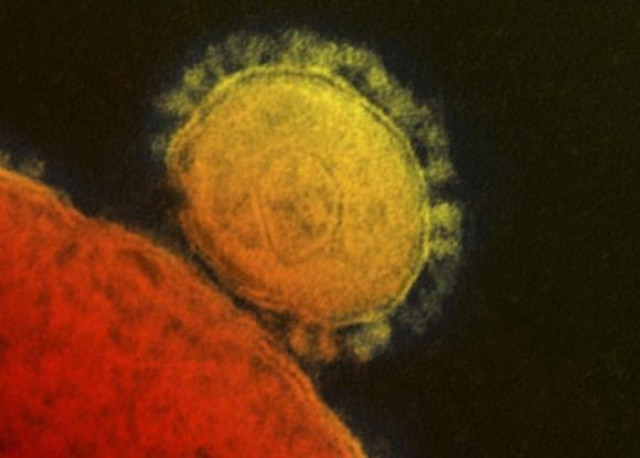UN warns countries to bolster fight against MERS virus
A total of 571 MERS cases have been reported to the WHO, of which 171 have proved fatal.

The Middle East Respiratory Syndrome (MERS) coronavirus is seen in an undated transmission electron micrograph from the National Institute for Allergy and Infectious Diseases (NIAID). PHOTO: REUTERS/FILE
The World Health Organisation said its emergency committee, which includes global medical and policy experts, had flagged mounting concerns about the potentially fatal Middle East Respiratory Virus (MERS).
"They reached a consensus that the situation had increased in seriousness and that their concerns about the situation had also increased in terms of urgency," Keiji Fukuda, the WHO's health security head, told reporters.
The agency called on countries to improve infection prevention and control, collect more data on the virus and to be vigilant in preventing it from spreading to vulnerable countries, notably in Africa.
A total of 571 MERS cases have been reported to the WHO, of which 171 have proved fatal. In many of them, victims caught the virus in hospital from other patients, although experts believe camels may also spread the disease.
The vast majority of infections have been reported in Saudi Arabia, and cases outside the Gulf nation have largely involved people who had travelled there.
On Wednesday the Netherlands became the 13th country outside of Saudi Arabia to report a case of MERS since December.
Fukuda said that while Riyadh had done its best to stem the spread of MERS, a WHO team there still found "sub-optimal" infection-control and overcrowding in hospitals.
Cases have also risen outside hospitals, possibly because of the winter season or an increase in infections among animal carriers, Fukuda said.
Saudi Arabia's agriculture ministry has urged citizens to wear masks and gloves when handling camels, which are thought to be the source of the mysterious coronavirus in the Gulf state.
The risk of MERS gaining the ability to spread further and faster has raised the spectre of a global crisis.
But the WHO has so far stopped short of declaring an international health emergency, which would have far-reaching implications like travel and trade restrictions on affected countries.
"It's clear is that there is no convincing evidence right now for an increase in the transmissibility of this virus," Fukuda said.
"If it is really associated with camels, and all of the infections are from camels to people and it does not become very transmissible among people, then I think that there's a reasonable chance that it would stay a regional infection."
MERS is considered a deadlier but less-transmissible cousin of the SARS virus that appeared in Asia in 2003 and infected 8,273 people, nine percent of whom died. It caused huge economic chaos.
Like SARS, it appears to cause a lung infection, with patients suffering coughing, breathing difficulties and a temperature.
But MERS differs in that it can also cause rapid kidney failure.
It has proven particularly lethal among older people and those with existing health problems.
Some 30 per cent of the several hundred people infected with it have died, according to the US Centre for Disease Control and Prevention.
MERS first emerged in 2012 in Saudi Arabia.
The annual hajj to Mecca, due in October, draws millions from across the globe and experts fear pilgrims could carry the virus home to nations that are far less able to detect and control it.
"We need to raise awareness about MERS infection among people who are going to be going on mass gatherings, as we know that a number of pilgrimages are going to be coming up," Fukuda said.
Saudi authorities and international health experts point out that the hajj has successfully ridden out two previous viral episodes in the past decade: SARS and the H1N1 influenza in 2009.
There have been confirmed or suspected cases in Egypt, Greece, Jordan, Kuwait, Lebanon, Malaysia, Oman, Philippines, Qatar, the United Arab Emirates, the United States and Yemen since December.
Thursday's closed-door WHO meeting was the fifth to be held on MERS, and another is expected in coming weeks, the agency said.



















COMMENTS
Comments are moderated and generally will be posted if they are on-topic and not abusive.
For more information, please see our Comments FAQ